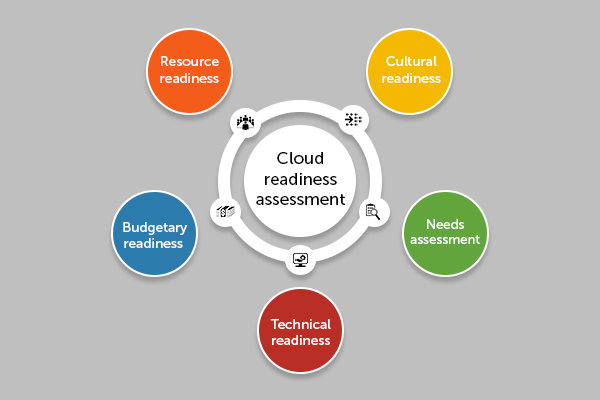
Assessing Workloads for Cloud Migration: Best Practices
Cloud computing has revolutionized the way businesses operate, providing greater flexibility, scalability, and accessibility to technology and data. As a result, more and more businesses are moving their operations to the cloud, allowing them to reduce infrastructure costs, enhance security and disaster recovery, and increase productivity and efficiency. In this article, we will explore the benefits of cloud migration for businesses and the challenges and considerations that must be taken into account.
Cloud migration refers to the process of moving a business’s digital operations, including data, applications, and services, from on-premise infrastructure to cloud-based infrastructure. Cloud-based infrastructure is hosted by third-party providers, who offer businesses access to resources such as storage, computing power, and software through the internet.
The benefits of cloud migration for businesses are numerous. Cloud-based infrastructure provides greater flexibility, scalability, accessibility, and security than on-premise infrastructure. By moving operations to the cloud, businesses can reduce infrastructure costs, enhance disaster recovery capabilities, increase productivity and efficiency, and gain a competitive edge.
The purpose of this article is to explore the benefits of cloud migration for businesses, including increased flexibility and scalability, improved collaboration and accessibility, enhanced security and disaster recovery, and cost savings. Additionally, we will examine the challenges and considerations associated with cloud migration and provide guidance for businesses considering a move to the cloud.
Cloud Migration Benefits
- Increased Flexibility and Scalability The cloud provides businesses with increased flexibility and scalability, enabling them to easily adjust their IT infrastructure based on their changing needs. The ability to quickly scale up or down based on business demands ensures that companies can stay competitive in their respective markets. In addition, the cloud provides access to a wide range of cloud-based services and applications that can be easily integrated into existing workflows.
- Reduced Infrastructure Costs One of the most significant benefits of cloud migration for businesses is the potential for significant cost savings. By moving to the cloud, businesses can eliminate the need for costly on-premise infrastructure, hardware, and maintenance. Instead, cloud providers handle the underlying infrastructure, freeing up businesses to focus on their core competencies.
- Improved Collaboration and Accessibility The cloud provides businesses with improved collaboration and accessibility. With cloud-based tools, employees can work together in real-time, regardless of their location. This increased collaboration and accessibility lead to improved productivity and efficiency, as employees can work more efficiently and effectively together.
- Increased Productivity and Efficiency Cloud migration can lead to increased productivity and efficiency for businesses. With the cloud, businesses can access a wide range of cloud-based services and applications that can automate and streamline many business processes. This leads to improved efficiency, reduced manual work, and increased productivity.
Security
- Enhanced Security and Disaster Recovery Security is a top concern for businesses considering cloud migration. Fortunately, cloud providers offer robust security measures, including advanced encryption, network security, and data backups. These measures help ensure that data is protected from both internal and external threats.
- Improved Disaster Recovery Capabilities In addition to enhanced security measures, the cloud also provides improved disaster recovery capabilities. With the cloud, businesses can easily replicate their data and systems to remote locations, ensuring that they can quickly recover from a disaster or outage.
- Reduced Risk of Data Loss or Breach Cloud providers employ a wide range of security measures to ensure that data is protected from both internal and external threats. These measures help reduce the risk of data loss or breach, which can be costly and damaging to a business.
- Reduced Capital Expenditures Cloud migration can also lead to reduced capital expenditures for businesses. By moving to the cloud, businesses can eliminate the need for costly on-premise infrastructure, hardware, and maintenance. Instead, they can pay for only the services and resources they need, when they need them.
Cost Savings
- Reduced Capital Expenditures One of the most significant benefits of cloud migration for businesses is the potential for significant cost savings. By moving to the cloud, businesses can eliminate the need for costly on-premise infrastructure, hardware, and maintenance. Instead, they can pay for only the services and resources they need, when they need them.
- Predictable Operational Expenditures Cloud migration can also lead to predictable operational expenditures for businesses. With the cloud, businesses pay only for the services and resources they need, when they need them. This eliminates the need for large upfront investments in infrastructure and hardware, leading to more predictable expenses.
- Reduced Need for On-Premise IT Staff Cloud migration can also lead to a reduced need for on-premise IT staff. With the cloud, businesses can rely on their cloud providers to handle the underlying infrastructure, freeing up their IT staff to focus on more strategic initiatives.
Challenges and Considerations
- Security and Compliance Considerations One of the most significant challenges for businesses considering cloud migration is security and compliance. It is essential to ensure that the cloud provider has robust security measures in place to protect data and ensure compliance with industry and regulatory standards.
- Integration with Existing Systems and Applications Another challenge for businesses considering cloud migration is the integration of existing systems and While cloud migration offers many benefits, it also poses certain challenges and considerations that businesses need to take into account before embarking on the journey. Some of these challenges include:
a) Security and compliance considerations: Businesses must ensure that their data is secure and in compliance with regulations when migrating to the cloud. This requires working with a trusted cloud service provider that has a robust security framework in place.
b) Integration with existing systems and applications: Integrating cloud-based systems with existing applications can be a complex process, and businesses need to ensure that they have a plan in place for seamless integration.
c) Vendor lock-in and potential for increased costs: When businesses move their data and applications to the cloud, they become reliant on their cloud service provider. This can result in vendor lock-in, making it difficult and costly to switch providers in the future.
Conclusion
Cloud migration offers many benefits for businesses, including increased flexibility, reduced infrastructure costs, improved collaboration and accessibility, increased productivity and efficiency, enhanced security and disaster recovery, cost savings, and more. However, it is important for businesses to consider the challenges and considerations associated with cloud migration before making the transition. By working with a trusted cloud service provider and developing a clear migration plan, businesses can leverage the benefits of cloud migration to drive growth, innovation, and success.





